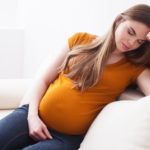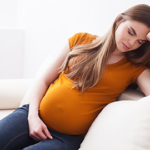Numerous studies have demonstrated that women with histories of bipolar disorder are at high risk for postpartum illness. Because of this increased risk for relapse during the postpartum period, we typically recommend that women with histories of bipolar disorder continue treatment with a mood stabilizer throughout the postpartum period. Historically, lithium has been the most commonly used mood stabilizer, and there is solid data to indicate that lithium initiated during pregnancy or immediately after delivery significantly decreases risk for relapse in women with bipolar disorder (Cohen et al 1995, Viguera et al 2000).
Today the use of lithium as a maintenance treatment for women with bipolar disorder is decreasing, and we are seeing more women who are maintained on anticonvulsants, such as lamotrigine (Lamictal), and atypical antipsychotics. Although we typically recommend that, during the postpartum period, women remain on the treatments that have kept them well during pregnancy, it has not been proven that treatments other than lithium would be as effective in preventing relapse during this time of heightened risk.
In fact, one study using valproic acid during the postpartum period (Wisner et al, 2004) suggested that prophylactic treatment with valproic acid was no more effective than monitoring in reducing risk of postpartum relapse.
Using Danish national registries Wesseloo and colleagues compared treatment with lamotrigine or lithium and risk for postpartum illness in women with histories of bipolar disorder. The researchers identified women with a diagnosis of bipolar disorder at the time of conception who were treated with either lamotrigine or lithium during pregnancy. They compared the risk of psychiatric hospitalization within three months postpartum between women using lamotrigine (N=55) versus those taking lithium (N=59) during pregnancy.
No significant differences in risk of postpartum psychiatric admission were observed between women treated with lamotrigine versus lithium during pregnancy (7.3% versus 15.3% respectively, adjusted OR 0.83; 95% CI 0.22-3.14).
The researchers concluded that lamotrigine was not inferior to lithium in its capacity to prevent severe postpartum illness; however, they acknowledged some limitations of their study. First, this study had a relatively small sample size; thus, they may not have had sufficient statistical power to detect significant differences between the two groups. Second, this study might have been affected by confounding by indication in that lithium was typically prescribed to women with a history of mania, whereas lamotrigine was primarily prescribed to women with a predominance of depressive episodes. And finally, this study was not designed to detect less severe postpartum episodes, as it only assessed risk for psychiatric hospitalization.
Nonetheless, this study is helpful and suggests that in a woman who has remained well on lamotrigine during pregnancy, it makes clinical sense to continue lamotrigine during the postpartum period in order to decrease her risk for relapse.
Ruta Nonacs, MD PhD
Postpartum prophylaxis for women with bipolar disorder. Cohen LS, Sichel DA, Robertson LM, Heckscher E, Rosenbaum JF. Am J Psychiatry. 1995 Nov;152(11):1641-5.
Prevention of postpartum episodes in women with bipolar disorder. Wisner KL, Hanusa BH, Peindl KS, Perel JM. Biol Psychiatry. 2004 Oct 15;56(8):592-6.
Risk of postpartum episodes in women with bipolar disorder after lamotrigine or lithium use during pregnancy: A population-based cohort study. Wesseloo R, Liu X, Clark CT, Kushner SA, Munk-Olsen T, Bergink V. J Affect Disord. 2017 May 3;218:394-397.
Risk of recurrence of bipolar disorder in pregnant and nonpregnant women after discontinuing lithium maintenance. Viguera AC, Nonacs R, Cohen LS, Tondo L, Murray A, Baldessarini RJ. Am J Psychiatry. 2000 Feb;157(2):179-84.








Leave A Comment